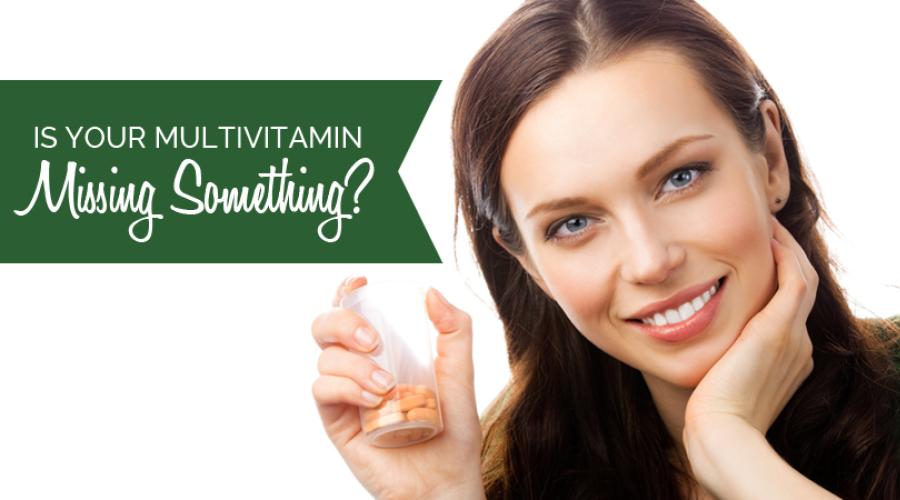
Most multivitamin manufacturers market their products as having everything your body needs in one easy, once-a-day pill. The truth is, that isn't exactly accurate. Multivitamins are missing a key nutrient that is critical to your health, especially for anyone over the age of 40.
That nutrient is Ubiquinol – the reduced, active antioxidant form of Coenzyme Q10, which your body naturally produces. Basically, Ubinquinol is CoQ10 that your body has converted to use in producing cellular energy. Ubiquinol is also the strongest lipid-soluble antioxidant available, which protects the body’s cells from oxidative stress, and is key to the long-term health of your heart, liver, brain and cardiovascular system. Check the “Supplement Facts” label on your multivitamin, and you’ll find a long list of vitamins, nutrients and minerals. What you won’t find is Ubiquinol, a nutrient that’s crucial in your body’s production of cellular energy and a powerful antioxidant that counteracts oxidative stress and fights off free radicals.
Even well-known, brand-name multivitamins such as Centrum and One-A-Day are missing Ubiquinol. Check the supplement facts label on Centrum Silver Women 50+ or One A Day Women’s 50+ Healthy Advantage. The list includes more than 20 vitamins, minerals and nutrients, such as Vitamin A, Vitamin C, Vitamin D, Vitamin E, Vitamin K, Thiamin, Riboflavin, Niacin, Vitamins B6 and B12, Folic Acid, Pantothenic Acid, Calcium, Iron, Zinc and more. You won’t find Ubiquinol on that list. However, before you feel too cheated, you should understand that it’s not really the multivitamin manufacturer’s fault. You see, Ubiquinol is a finicky supplement.
Unlike most nutrients that are water-soluble, Ubiquinol is fat-soluble, which is why ubiquinol can only be delivered via softgels or liquid capsules. When Ubiquinol oxidizes, it turns into Ubiquinone – the form used in conventional CoQ10 supplements. In fact, Ubiquinol’s delicate nature is why it wasn’t commercially available in supplement form until 2006, when Kaneka Nutrients perfected the process of stabilizing and manufacturing Ubiquinol and introduced it to the market for use in supplements. In order to create Ubiquinol, Kaneka Nutrients developed a proprietary process that allows Ubiquinol to be stabilized in supplement form. The Ubiquinol ingredient, which is naturally fermented from yeast, is suspended in an oil, which is then put into either softgel or liquid capsules.
That’s why you won’t find Ubiquinol in any of your multivitamins, no matter how well-known the brand name or high-priced the brand may be. It’s also the reason that traditional CoQ10 supplements were available only in the oxidized form (ubiquinone) for more than 30 years. Coenzyme Q10 supplements are commercially available in two forms: ubiquinone, the oxidized form of CoQ10, and ubiquinol, which is the fully reduced form of CoQ10. Supplement manufacturers can produce CoQ10 supplements in the form of ubiquinone, but producing Ubiquinol requires special handling and specific equipment to ensure it doesn’t oxidize and turn into ubiquinone. Are you taking the right form?
Multiple studies have found Ubiquinol – the reduced form of CoQ10 – is more effective at slowing down the aging process than ubiquinone, which is the oxidized form of CoQ10. That’s because your body can’t use traditional CoQ10 supplements as efficiently as Ubiquinol. The body of a healthy 20-year-old naturally produces all the ubiquinone it needs, easily converts it to Ubiquinol, then puts the nutrient to work in producing cellular energy and fighting off oxidative stress. But as we age, our bodies become less efficient at making that conversion, and certain medications – including cholesterol-reducing drugs, estrogen hormones and common antacids and antibiotics – can hamper the process even more.
Research shows that taking Ubiquinol is more beneficial than taking conventional CoQ10 supplements for anyone over the age of 30. This is because the conversion from CoQ10 to Ubiquinol has already been done for you – outside your body – meaning the Ubiquinol is immediately ready for your body to use. In fact, every study to date shows Ubiquinol is more absorbable by the body and more effective at slowing down the aging process than conventional CoQ10.
The other reason you won’t find Ubiquinol in your multivitamin is that most multivitamins are manufactured as tablets or hard pills – some might say “horse pills.” But very few multivitamins are encapsulated in oil as Ubiquinol must be to stay in its active, antioxidant form. So, even if you’re taking the right step by taking a daily multivitamin, you should take it a step further by adding a Ubiquinol supplement to your daily routine. Multivitamins are missing Ubiquinol, a crucial nutrient for cellular energy production and for the long-term health of your heart, liver, brain and cardiovascular system. Find a retailer near you that carries Ubiquinol supplements or visit the Buyer's Guide to learn more.












